中考英语现在完成时精讲精练
初中现在完成时态讲解带练习

一.现在完成时的含义及用法1.现在完成时表示过去发生的动作,并对现在有影响。
2.现在完成时表示从过去一直持续到现在的动作或状态。
现在完成时的根本句型:肯定式:主语+ 助动词have/has + 动词的过去分词.否认式:主语+ 助动词have/has + not + 动词的过去分词.疑问式:助动词Have/Has + 主语+ 动词的过去分词?用法①现在完成时表示过去发生的动作,并对现在有影响。
Someone has broken the window. (窗户现在是坏的)I have already lost the key. (我现在没有钥匙)I haven’t read that book yet . (不了解书的内容)I have just cleaned my hands. (手是干净的)此时,现在完成时常与already(已经), yet(已经), just(刚刚),ever(曾经)等词连用,通常放在助动词之后,过去分词之前。
already: 常用于肯定句中.yet: 用于否认句,翻译为还没。
疑问句尾.翻译为已经1.你已经找到你的书了吗?2.他们在这个城市建了许多房子.3.Judy还没到达.4.你吃过早饭了吗?用法②现在完成时表示从过去一直持续到现在的动作或状态。
She has learned English for 5 years.He has lived in Beijing since ( 自从)he was born .Have you stayed here since ( 自从) 3 o’clock?for+ 时间段since+时间点, since+ 句子①Mr. Brown has had his TV _____15 years.②I’ve taken driving lessons _______last month.③My sister has had her cell phone _____a month .④My friends haven’t visited me _______ my birthday.⑤We haven’t used our car _____a long time .⑥She hasn’t h ad a good cup of coffee ____ years.⑦Tom has worn glasses _______he was 7 years old.二.have been 与have gone 的用法比拟have been to “到过,去过〞,表示曾经到过某处,但现在人不在那儿。
中考英语复习 【精讲精练】现在完成时
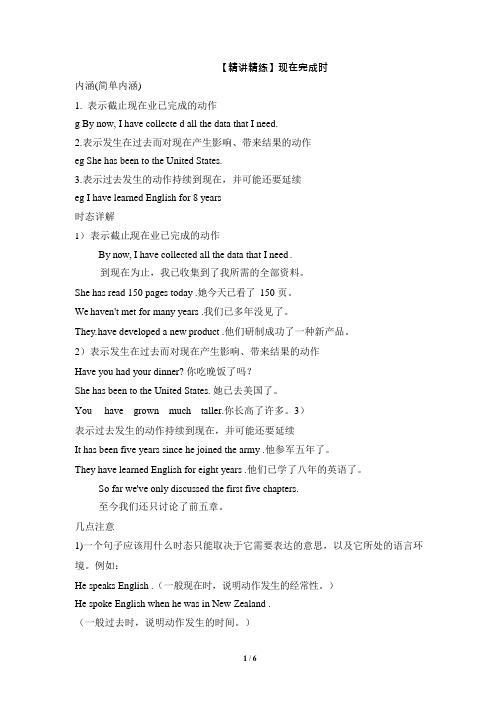
【精讲精练】现在完成时内涵(简单内涵)1.表示截止现在业已完成的动作g By now, I have collecte d all the data that I need.2.表示发生在过去而对现在产生影响、带来结果的动作eg She has been to the United States.3.表示过去发生的动作持续到现在,并可能还要延续eg I have learned English for 8 years时态详解1)表示截止现在业已完成的动作By now, I have collected all the data that I need .到现在为止,我已收集到了我所需的全部资料。
She has read 150 pages today .她今天已看了150 页。
We haven't met for many years .我们已多年没见了。
They have developed a new product .他们研制成功了一种新产品。
2)表示发生在过去而对现在产生影响、带来结果的动作Have you had your dinner? 你吃晚饭了吗?She has been to the United States. 她已去美国了。
You have grown much taller.你长高了许多。
3)表示过去发生的动作持续到现在,并可能还要延续It has been five years since he joined the army .他参军五年了。
They have learned English for eight years .他们已学了八年的英语了。
So far we've only discussed the first five chapters.至今我们还只讨论了前五章。
几点注意1)一个句子应该用什么时态只能取决于它需要表达的意思,以及它所处的语言环境。
人教版九年级英语精品讲义-现在完成时精讲精练(学生卷)

专题04现在完成时精讲精练模块一:结构公式模块二:现在完成时有两个主要用法模块三:have been VS have gone模块四:特别句型模块五:现在完成时和过去时区别模块一:结构公式:sb.have/has done时间状语:already,yet,just,so far,never,ever,since+过去时间点,for+一段时间,in thepast/last few years现在完成时的简单定义:1)过去发生的动作对现在产生一定的影响;2)过去发生的动作一直延续到现在。
比较:(学生版不出现)I had10hamburgers today.(今天“吃”的行为已结束,10为最终结果。
)I have had10hamburgers today.(今天到目前为止吃了10个,可能很饱,也可能还不尽兴。
)模块二:现在完成时有两个主要用法*Hanged,hanged绞死Hung,hung悬挂Lie躺lay,lain,lying;说谎lied,liedLay放置,下蛋laid,laid(雷的,雷的)♥Attention♥你还能列出现在完成时的一些时间状语吗?recently,lately,总次数……(XX times)1.since用法结构公式:现在完成时+since+一般过去式/过去的时间状语1)I’ve known my best friend since we were in high school.2.瞬间动词不能直接和for,since的完成时连用瞬间动词变成延续动词1)borrow---_____keep______________2)buy-----_______have______________3)catch a cold----_have a cold_________4)die---_________be dead___________5)fall asleep---___be asleep___________6)fall ill-----______be ill______________7)join------_______be in______________8)leave---_______be away____________9)marry----______be married_________10)start----_______be on______________11)end----_______be over___________模块三:have been VS have gone总结:模块四:特别句型a.It/This+is+序数词+n+现在完成时It is the first time that I’ve seen such a wonderful performance.这是我第一次看到如此精彩的表演。
2024年中考英语语法-现在完成时精讲及专项练习
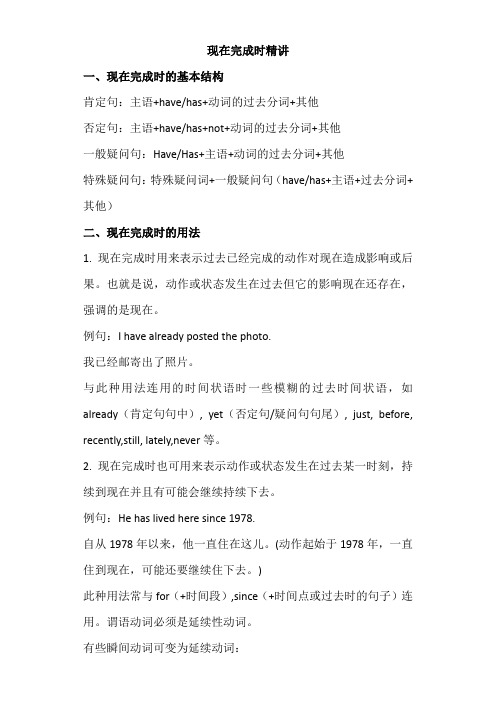
现在完成时精讲一、现在完成时的基本结构肯定句:主语+have/has+动词的过去分词+其他否定句:主语+have/has+not+动词的过去分词+其他一般疑问句:Have/Has+主语+动词的过去分词+其他特殊疑问句:特殊疑问词+一般疑问句(have/has+主语+过去分词+其他)二、现在完成时的用法1. 现在完成时用来表示过去已经完成的动作对现在造成影响或后果。
也就是说,动作或状态发生在过去但它的影响现在还存在,强调的是现在。
例句:I have already posted the photo.我已经邮寄出了照片。
与此种用法连用的时间状语时一些模糊的过去时间状语,如already(肯定句句中), yet(否定句/疑问句句尾), just, before, recently,still, lately,never等。
2. 现在完成时也可用来表示动作或状态发生在过去某一时刻,持续到现在并且有可能会继续持续下去。
例句:He has lived here since 1978.自从1978年以来,他一直住在这儿。
(动作起始于1978年,一直住到现在,可能还要继续住下去。
)此种用法常与for(+时间段),since(+时间点或过去时的句子)连用。
谓语动词必须是延续性动词。
有些瞬间动词可变为延续动词:go outbe outfinishbe overopenbe opendiebe deadbuyhavefall illbe ille backbe backcatch a coldhave a cold3.现在完成时表示重复这种完成时一般表示:过去到现在不断重复发生的动作或情况;可能继续;可能到此结束。
例句:My father has always gone to work by bike.4.现在完成时表示将来可以在时间状语从句里表示将来。
例句:When you have rested, I’ll show you the garden.三、过去分词的规则变化动词过去分词的规则变化与动词过去式的规则变化相同。
中考英语专题讲练现在完成时(含解析)
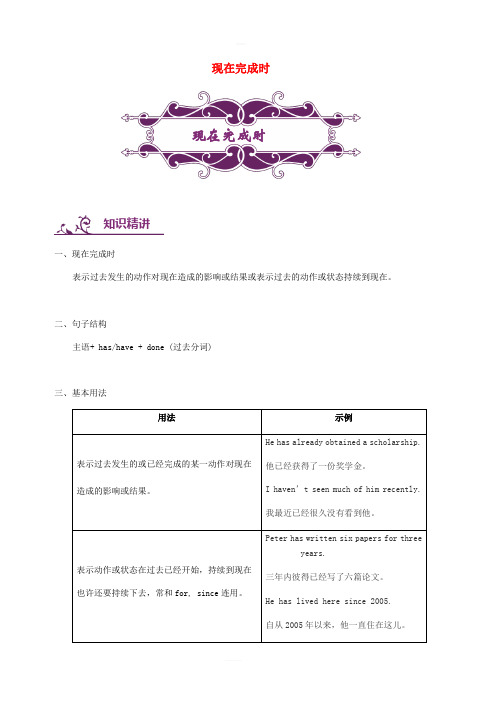
现在完成时现在完成时知识精讲一、现在完成时表示过去发生的动作对现在造成的影响或结果或表示过去的动作或状态持续到现在。
二、句子结构主语+ has/have + done (过去分词)三、基本用法四、时间状语1. yet (常用于否定或疑问句中), already (常用于肯定句中)2. since+过去时间点/过去时的从句(译为:自从…以来)3. for+时间段4. just, so far, recently, never, ever, twice…5. in the past / last few days五、动词过去分词的规则变化六、动词过去分词的不规则变化:七、相关句式八、瞬间动词和延续性动词之间的转换:在完成时中,一个瞬间动词不能直接与表示一段时间的状语(for, since等)连用。
此时须将该瞬间动词改为延续性动词或状态动词:例:The film began five minutes ago.---The film has been on for five minutes.---It has been five minutes since the film began.用“be+形容词”代终止性动词1. “ be+married”代替marry2. “be+ill”代替fall (get) ill3. “be+dead”代替die4. “be+asleep”代替fall (get) asleep5. “be+awake”代替wake/wake up6. “be+gone”代替lose, die, sell, leave7. “be+open”代替open8. “be closed”代替close/shut用“be+副词”代终止性动词1. “be+on”代替start, begin2. “be+up”代替get up3. “be+back(to)”代替return to, come back to, go back to4. “be here (there)”代替come(arrive, reach, get) here或go (arrive, reach, get) there等等用“be+介词短语”代终止性动词1.”be in/at +地点”代替go to /come to2.”用be in the army”代替join the army3.”be in/at +地点”代替move to三点剖析一、考点:现在完成时的基本用法和时间状语;以及动词过去分词的变化规则。
初中现在完成时讲解与练习全

1)一般过去时表示过去某时发生的动作或单纯叙述过去的事 情,强调动作;
现在完成时为过去发生的,强调过去的事情对现在的影响, 强调的是影响。
be away be here be on(上演) be over be in be married
1. 他的爷爷已经去世2年了。 2. Nick 参军3年了. 3. 他离开深圳好长时间了。 4. 这本书我已借了4个月了.
I have kept the book for 4 months.
method 2:
I worked here for more than twenty years. (我现在已不在这里工作。)
I have worked here for many years. (现在我仍在这里工作。)
现在完成时 Present perfect 句型
1.肯定句
“主语 + have(has)+过去分词”。
3. Mum’s cooked the dinner. Mum _______ ________ the dinner.
4. Susan’s learned English at school.
Susan ________ _le__a_r_n_e__dEnglish at school.
疑问句
Have you eaten your breakfast? 现在完成时的一般疑问句形式
for+ 时间段 since+时间点 , since+ 句子
比较since和for since 用来说明动作起始时间— “自从……”
for用来说明动作延续时间长度— “长达……”
I have lived here for more than twenty years. I have lived here since I was born. My aunt has worked in a company since 1949. I have not heard from my uncle for a long time. 注意:并非有for 作为时间状语的句子都用现在完成时
现在完成时用法精讲精练(1)
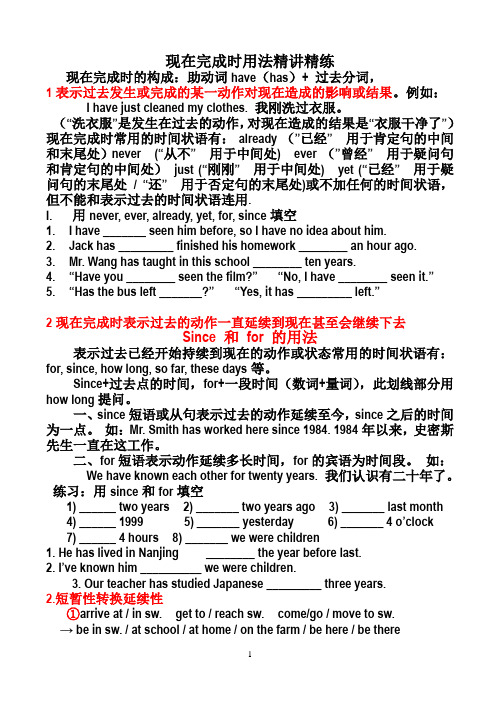
现在完成时用法精讲精练现在完成时的构成:助动词have(has)+ 过去分词,1表示过去发生或完成的某一动作对现在造成的影响或结果。
例如:I have just cleaned my clothes. 我刚洗过衣服。
(“洗衣服”是发生在过去的动作,对现在造成的结果是“衣服干净了”)现在完成时常用的时间状语有:already (”已经” 用于肯定句的中间和末尾处)never (“从不” 用于中间处)ever (”曾经” 用于疑问句和肯定句的中间处)just (“刚刚” 用于中间处)yet (“已经” 用于疑问句的末尾处/ “还” 用于否定句的末尾处)或不加任何的时间状语,但不能和表示过去的时间状语连用.I.用never, ever, already, yet, for, since填空1. I have _______ seen him before, so I have no idea about him.2. Jack has _________ finished his homework ________ an hour ago.3. Mr. Wang has taught in this school ________ ten years.4. “Have you ________ seen the film?” “No, I have ________ seen it.”5. “Has the bus left _______?” “Yes, it has _________ left.”2现在完成时表示过去的动作一直延续到现在甚至会继续下去Since 和for 的用法表示过去已经开始持续到现在的动作或状态常用的时间状语有:for, since, how long, so far, these days等。
Since+过去点的时间,for+一段时间(数词+量词),此划线部分用how long提问。
初中现在完成时精讲+精练(附答案)

初中现在完成时精讲+精练(附答案)现在完成时The Present Perfect tense定义:1.现在完成时表示过去发生或已完成的动作对现在造成的影响;I have already had breakfast.(我已吃过早餐,我不饿了)2.现在完成时态还表示过去某一时间已经开始并一直持续到现在(还有持续下去的可能)的动作或状态,可以和表示延续的时间状语连用表示持续的动作或状态的动词多是延续性动词。
We have lived here for ten years.我们已经在这里住了10年了。
(从过去一直到现在都住在这里,并且还会一直持续)主语+ have/ has + 过去分词(pp)1) 表示到现在为止已经完成或刚刚完成的动作。
eg1:Now we have planted all the trees.我们现在刚把所有的树种好。
eg2: He has just come back.他刚刚回来。
eg3:They have built many buildings in this city.在这个城市里,他们已经建造了很多建筑物。
2) 表示过去发生的动作,强调结果或对现在的影响。
常与just、already、yet连用。
eg1:Someone has broken the window. (窗户现在是坏的)eg2: I have already lost the key. (我现在没有钥匙)e g3: I haven’t read that book yet . (不了解书的内容)eg4: I have just cleaned my hands. (手是干净的)※常与already(已经), yet(已经), just(刚刚),ever(曾经),never,for+时间段,since+时间点等词或短语连用.※already: 常用于肯定句中.yet: 常用于否定句,疑问句尾.3) 表示从过去开始并持续到现在的动作或状态,常与for和since 等表示一段时间的状语连用。
最新中考初中语法现在完成时态讲解及练习

中考初中语法现在完成时态讲解及练习一、现在完成时的构成肯定句:主语+have/ has + done过去分词)+其它He has lived in She nzhe n for 4 years.一般疑问句:Have/ HaS +主语+ done (过去分词)+其它HaS he lived in Shen Zhe n for 4 years?否定句:主语+have/ has+ not + done过去分词)+其它He has not fini Shed his homework.过去分词的构成方法如下:1■一般情况下,直接在动词原形后面加-ed.WOrk---WOrked anSWer---anSWered obey---Obeyed Want---Wanted2■以不发音的-e结尾的动词只加—Move---moved hope---hoped divide---divided3■字尾是辅音+y的动词。
则将y改i加ed.StUdy---studied tidy---tidied SatiSfy---satisfied4■以重读闭音节结尾的词,这些词的末尾只有一个辅音字母时,双写这个辅音字母,再加Pd. stop---stopped regret--- regretted drop---dropped不规则动词过去式与过去分词分类记忆表二、ABB (过去式和过去分词一致)1)-Ought2)-aught 35 6)过去式、过去分词改为-elt7)过去式、过去分词改为-aid 10)其它变化四、ABC (原形、过去式、过去分词各不一样)1).过去分词在过去式或原形后加 -n 或-en2)三种形式都有变化二、现在完成时标志词:recently; recent years; these days/ years; lately; since; for+ 时间段;in the PaSt few years; ever since; in the last five months; UP to now; SinCe then; so far; ever; never, yet; once; twice; already; before; just already (已经):用于肯定句I have already POSted the Ietter .yet(已经):用于否定句,疑问句He hasn ' t done his homework yet.just(刚刚)They have just left.ever(曾经)HaVe you ever bee n to Beiji ng ?n ever(从不)I have n ever See n him .before(以前)HaVe you See n the film before?Sin ce(自从…以来)I ' Ve WOrked in the schoohce 1999.for(长达)He' S lived in Shenzhen for 6 years.in the PaSt SeVeraI days / weeks/ year在过去的…)rece ntly (最近)I have not Written to my Parents recently.so far(到目前为止)So far She has lear ned 5 En glish son gs.UP to now(到目前为止)this morning/month/year(今天早上/这个月/今年)三、现在完成时的用法1)现在完成时表示过去发生的动作,并对现在有影响。
中考专题复习之现在完成时知识精讲+练习题
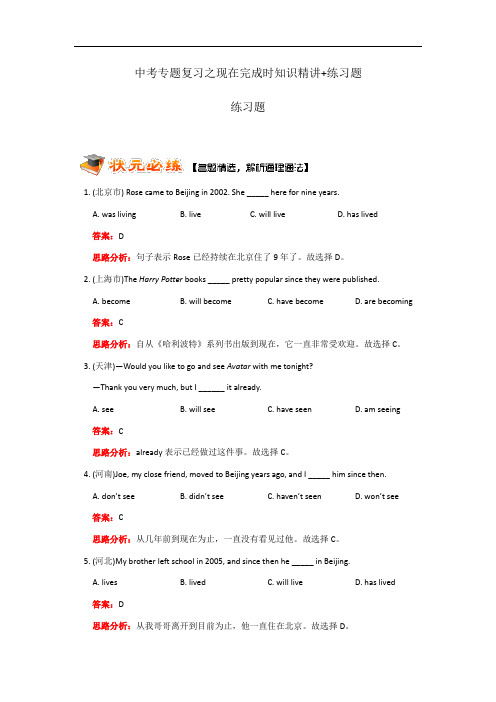
中考专题复习之现在完成时知识精讲+练习题练习题1. (北京市) Rose came to Beijing in 2002. She _____ here for nine years.A. was livingB. liveC. will liveD. has lived答案:D思路分析:句子表示Rose已经持续在北京住了9年了。
故选择D。
2. (上海市)The Harry Potter books _____ pretty popular since they were published.A. becomeB. will becomeC. have becomeD. are becoming 答案:C思路分析:自从《哈利波特》系列书出版到现在,它一直非常受欢迎。
故选择C。
3. (天津)—Would you like to go and see Avatar with me tonight?—Thank you very much, but I ______ it already.A. seeB. will seeC. have seenD. am seeing答案:C思路分析:already表示已经做过这件事。
故选择C。
4. (河南)Joe, my close friend, moved to Beijing years ago, and I _____ him since then.A. don’t seeB. didn’t seeC. haven’t seenD. won’t see答案:C思路分析:从几年前到现在为止,一直没有看见过他。
故选择C。
5. (河北)My brother left school in 2005, and since then he _____ in Beijing.A. livesB. livedC. will liveD. has lived答案:D思路分析:从我哥哥离开到目前为止,他一直住在北京。
英语现在完成时精讲+精练(附答案)

英语现在完成时精讲+精练(附答案)英语中的现在完成时表示过去发生的事情对现在产生的影响或仍在继续的动作,结构为“have/has + 过去分词”。
本篇文章将对现在完成时的用法进行详细讲解和练。
一、现在完成时的主要用法现在完成时有以下三种主要用法:1. 表示过去发生的动作对现在产生的影响例如:- I have lost my phone.(我手机丢了。
)- She has forgotten the meeting.(她忘了会议。
)以上两句话中,手机丢了和会议被忘了都是在过去发生的事情,但是现在失去手机和忘记会议都对现在产生影响,因此需要用现在完成时来表达。
2. 表示从过去某个时间开始一直持续到现在的动作例如:- I have worked here for two years.(我在这里工作已经两年了。
)- They have been married since 2010.(他们自 2010 年以来就结婚了。
)以上两个句子都是表示从过去某个时间开始到现在一直持续的动作,需要用现在完成时来表达。
3. 表示刚刚发生的动作例如:- I have just finished my homework.(我刚刚完成了我的作业。
)- He has just arrived.(他刚刚到了。
)以上两句话中,都是刚刚发生的动作,需要用现在完成时来表达。
二、现在完成时的结构现在完成时的结构为“have/has + 过去分词”:- have + 过去分词,用于第一人称复数(we)、第二人称复数(you)和第三人称复数(they)以及第一人称单数(I)与第二人称单数(you)构成疑问句和否定句。
- has + 过去分词,用于第三人称单数(he、she、it)构成一般句。
例如:- I have visited London twice.(我去过伦敦两次。
)- Have you finished your homework?(你完成作业了吗?)- She has seen the movie before.(她之前看过这部电影。
初中英语现在完成时态详细讲解及其练习

注意事项
单击此处可添加副标题
have been(to)与 have gone( to)的区别:have been(to)表示“去过某地(现在已经回来了)”,可用于 各人称;have gone(to)表示“去某地了(说话时某人不 在当地)”,常用于第三人称,前者可与 once , never, several times 等连用,后者则不能。
pictures ❖ (A ) has just (B)have ever (C)has yet
(D)have already
❖ 二 选择填空
_ ❖ ( ) 1. ——Have you finished your homework ——Yes, I it last night ❖ (A) finish (B) finished (C) have finished (D) will finish
三 用 since 和 for 填空 (一)
❖ 1) ______ two years _______ two years ago 2) _______ last month 3) _______ yesterday 4) _______ an hour ago 5) ______ she left here 6) _______ 4 o’clock 8) ______ 1999
归纳总结:由非延续性动词到延续性动 词的转换
• arrive→be here die →be dead begin (start)→ be on • come back→ be back fall ill (sick, asleep )→be ill (sick,
asleep) leave →be away get up→ be up finish →be over • open →be open close →be closed borrow →keep • be on →be in 或 be a member of… go to school→be a
中考初中语法之现在完成时讲解+练习
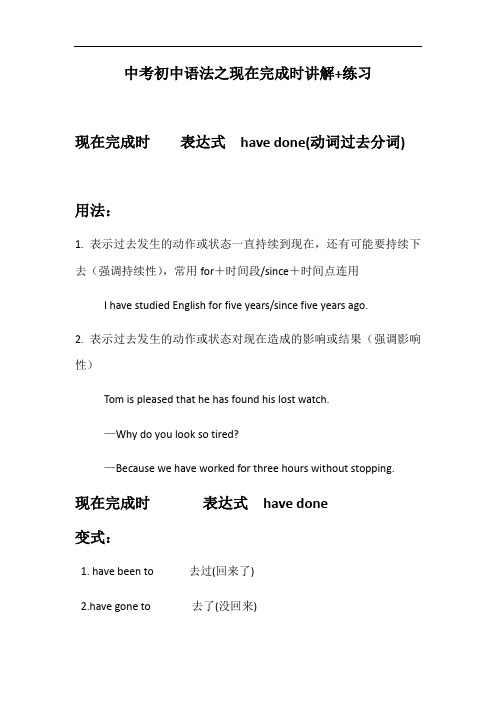
中考初中语法之现在完成时讲解+练习现在完成时表达式have done(动词过去分词)用法:1. 表示过去发生的动作或状态一直持续到现在,还有可能要持续下去(强调持续性),常用for+时间段/since+时间点连用I have studied English for five years/since five years ago.2. 表示过去发生的动作或状态对现在造成的影响或结果(强调影响性)Tom is pleased that he has found his lost watch.—Why do you look so tired?—Because we have worked for three hours without stopping.现在完成时表达式have done变式:1. have been to 去过(回来了)2.have gone to 去了(没回来)3. have been in 在某地呆了.....例句:1. I have never been to Shanghai.2.--- Where is your mother?---My mother has gone to the supermarket.3.John has been in China for five years.注意:在“it is the first/second...time that...。
”或在“it/this/that is the +最高级+名词+that...。
”结构中,that从句中的动词常用现在完成时;表示到说话时为止动作发生过几次。
在“it + be...+since从句”这一结构中,be可用一般现在时或现在完成时,since从句一般用过去时。
have/has/had +been +动词的现在进行时。
1)现在完成时和一般过去时都能表示过去发生过的动作,但现在完成时表示过去动作对现在的影响,并且表示这一动作已完成或还可能继续下去;2)而一般过去时与现在的情况没有联系,仅表示过去的动作,且这一动作到说话时已终止。
中考现在完成时透析精练
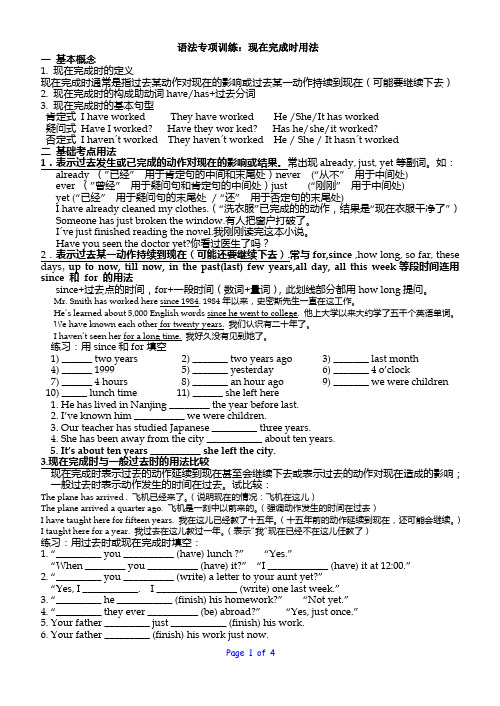
一基本概念1. 现在完成时的定义现在完成时通常是指过去某动作对现在的影响或过去某一动作持续到现在(可能要继续下去)2. 现在完成时的构成助动词have/has+过去分词3. 现在完成时的基本句型肯定式I have worked They have worked He /She/It has worked疑问式Have I worked? Have they wor ked? Has he/she/it worked?否定式I haven´t worked They haven´t worked He / She / It hasn´t worked二基础考点用法1.表示过去发生或已完成的动作对现在的影响或结果。
常出现already, just, yet等副词。
如:(“从不”用于中间处) ever (”曾经”用于疑问句和肯定句的中间处)just (“刚刚”用于中间处)yet (“已经”用于疑问句的末尾处/ “还”用于否定句的末尾处)I have already cleaned my clothes.(“洗衣服”已完成的的动作,结果是“现在衣服干净了”)Someone has just broken the window.有人把窗户打破了。
I´ve just finished reading the novel.我刚刚读完这本小说。
Have you seen the doctor yet?你看过医生了吗?2.表示过去某一动作持续到现在(可能还要继续下去).常与for,since ,how long, so far, these ,all this week等段时间连用since 和for 的用法since+过去点的时间,for+一段时间(数词+量词),此划线部分都用how long提问。
Mr. Smith has worked here since 1984. 1984年以来,史密斯先生一直在这工作。
2023年中考英语语法复习现在完成时讲解和练习题
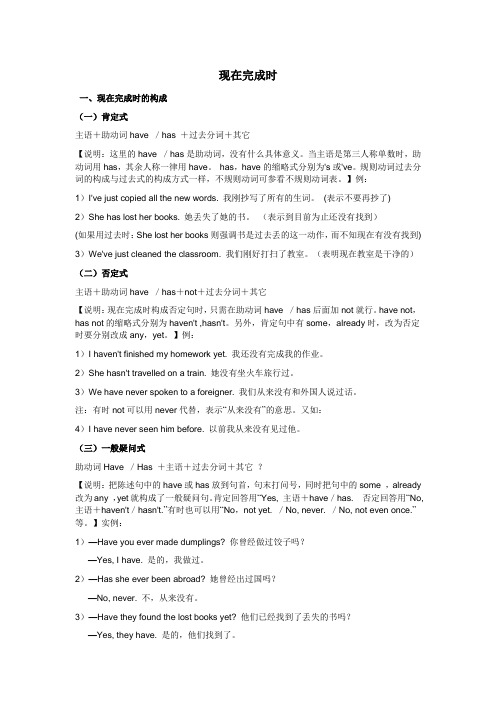
现在完成时一、现在完成时的构成(一)肯定式主语+助动词have /has +过去分词+其它【说明:这里的have /has是助动词,没有什么具体意义。
当主语是第三人称单数时,助动词用has,其余人称一律用have。
has,have的缩略式分别为's或've。
规则动词过去分词的构成与过去式的构成方式一样,不规则动词可参看不规则动词表。
】例:1)I've just copied all the new words. 我刚抄写了所有的生词。
(表示不要再抄了)2)She has lost her books. 她丢失了她的书。
(表示到目前为止还没有找到)(如果用过去时:She lost her books则强调书是过去丢的这一动作,而不知现在有没有找到)3)We've just cleaned the classroom. 我们刚好打扫了教室。
(表明现在教室是干净的)(二)否定式主语+助动词have /has+not+过去分词+其它【说明:现在完成时构成否定句时,只需在助动词have /has后面加not就行。
have not,has not的缩略式分别为haven't ,hasn't。
另外,肯定句中有some,already时,改为否定时要分别改成any,yet。
】例:1)I haven't finished my homework yet. 我还没有完成我的作业。
2)She hasn't travelled on a train. 她没有坐火车旅行过。
3)We have never spoken to a foreigner. 我们从来没有和外国人说过话。
注:有时not可以用never代替,表示“从来没有”的意思。
又如:4)I have never seen him before. 以前我从来没有见过他。
(三)一般疑问式助动词Have /Has +主语+过去分词+其它?【说明:把陈述句中的have或has放到句首,句末打问号,同时把句中的some ,already 改为any ,yet就构成了一般疑问句。
- 1、下载文档前请自行甄别文档内容的完整性,平台不提供额外的编辑、内容补充、找答案等附加服务。
- 2、"仅部分预览"的文档,不可在线预览部分如存在完整性等问题,可反馈申请退款(可完整预览的文档不适用该条件!)。
- 3、如文档侵犯您的权益,请联系客服反馈,我们会尽快为您处理(人工客服工作时间:9:00-18:30)。
中考英语现在完成时精讲精练语法精讲(一)定义现在完成时主要用来表示过去发生的动作对现在造成的影响或结果。
如:•I have already seen the film.•She has just had a bath.第一句说明看电影是过去发生的,用了现在完成时是要表示说话者可能不想再看了,或者对该电影的内容已经很熟悉了,等等。
第二句说明她洗澡是过去发生的,用了现在完成时是要表示她不需要再洗澡了等。
(二)基本结构现在完成时的句子结构一般为:肯定句主语+have/has+过去分词+其他成分•We have already had lunch.•He has been away for a week.肯定句:主语+have/has+动词的过去分词+其他否定句:主语+have/has+not+动词的过去分词+其他一般疑问句:Have/Has+主语+动词的过去分词+其他特殊疑问句:特殊疑问词+一般疑问句(have/has+主语+过去分词+其他)(三)主要用法1、表示过去发生并且已经完成的动作对现在造成的影响或结果。
此时,常和谓语动词一起使用的副词有already、just、never、ever、yet等。
如:•They have already come back from the museum.•She has already finished her homework.2、表示过去发生的动作持续到现在,并且有可能会继续持续下去。
此时,常和谓语动词一起使用的标志性词语主要有for和since,而且此时的谓语动词往往是持续性动词(如stay、keep、wait等)。
如:•I have lived here for ten years.•He has kept the clavichord since thirty years ago.3、表示从过去某一时间到说话时这段时间中反复发生的动作。
此时,常和谓语动词一起使用的主要是表频度的副词often、always、seldom、never等,以及表次数的单词或短语(如once、twice、three times)。
如:•You have never listened to me like this before.•She has ever been to France.•They have visited the Summer Palace many times.(四)动词的过去分词1、规则变化其变化规则与动词的一般过去时基本相同,主要是在词尾加-ed或-d。
具体的有:1)直接加-ed。
如:worked、played。
2)以不发音的e结尾的动词后加-d。
如:lived、danced。
3)以辅音字母加y结尾的动词后改y为i,再加-ed。
如:studied、cried。
4)以重读闭音节结尾的动词后,双写最后一个辅音字母再加-ed。
如:stopped、patted。
2、不规则变化如果结合动词的过去式,动词的过去分词的不规则变化中,又有一些相对的规则现象。
如:1)AAA型。
如:put put put;read read read。
其中,read的过去式和过去分词虽然拼写时一样的,但其发音与原形不同,ea不再读作[iː],而是[e]。
2)ABB型。
如:k eep k ept k ept;s i t s a t s a t3)ABA型。
如:r u n r a n r u n;c o me c a me c o me4)ABC型。
如:l ie l ay l ain;dr i nk dr a nk dr u nk5)AAB型。
如:b eat b eat b eaten(五)标志性词语1、副词already、just、never、ever、yet等。
如:•She hasn't arrived in Scotland yet.•They have just left for Shanghai.2、for和since。
for+一段时间,since+具体时间。
如:•He has learned Italian for five months.•He has learned Italian since five months ago.3、so far和up to/till now。
表示“迄今为止”。
如:•So far, no one has heard any news about her.•She has read fifty books up to now.4、recently、lately等表示“最近;最新”的副词和形容词。
如:•I've met her on several occasions recently.•He hasn't had enough sleep lately.5、in the past/last+一段时间,表示“在过去的...时间里”。
如:•In the past few years, new buildings have sprung up all over Beijing. •He had aged rapidly in the last few months.6、次数。
如:•I've tried many times, but there's no way.•He has been there at least twice.(六)have been to/have gone to/have been in1、have been to表示“去过已回”。
句子主语就在现场。
如:•They have been to Rome many times.•She has been to Shanghai more than once.2、have gone to表示“去了未回”。
句子主语不在现场。
如:•Jerry has gone to Hangzhou.•Mary has gone to Finland.3、have been in表示“一直待在某地”。
如:•We have been in Beijing for five weeks.•They have been in China since 2012.同步练习题【典型考例1】(2019江苏南通)----Is everyone here, Jonathan?----No. Sir. Millie is absent. She for two days.A.has fallen illB. has been illC. fell illD. was ill 【析】正确答案B。
句意是:乔纳森,人到齐了吗?老师,没有。
米莉缺席了。
她生病已经两天了。
Fall ill与be ill都表示“生病”,但fall ill为非延续性动词,在现在完成时中不可与段时间连用,须转换为be ill才可以,所以,正确答案为B。
【典型考例2】(2019广西玉林)---Jenny, your new tape player looks great.----Oh, it’s not new. I _____ it for three years.A.buyB.have hadC.boughtD.have bought 【析】正确答案:B。
句意是:詹妮,你的新随身听看上很不错啊!哦,它不是新的。
我已经买了3年了。
非延续性动词buy在现在完成时中,不可与段时间状语连用,因此,须转换为延续性同义动词have或own。
所以,正确答案为B 。
【强化练习】一、根据汉语意义或首字母提示,写出正确单词。
1.(2019四川广安)I haven’t ________ (收到…来信) from Sally before.2.(2019浙江杭州).I’m very hungry . I haven’t e_______ anything since 7:00 this morning3.(2019广西北部湾经济开发区)Bob and Jim have been good friends_______(自从)they joined the same tennis team.二、用所给单词的正确形式填空4.(2019山东青岛)The writer is so popular that he _______(sell) more than 200,000 books so far.5.(2019江苏连云港)---I____ (have a fever)since last night.---You’d better go to see a doctor.6.(2019江苏泰州)So far, the couple ___________ (not change) their flat since they had a second child.7.(2019甘肃兰州)Jim has never ________(be) to Mount Tai in China.8.(2019贵州安顺)Sandy borrowed the novel from the library last week and ________(keep) it for 5 days.9.(2019湖北鄂州)Cathy and Linda ( not be) back to their hometown for two years.10.(2019江苏南通)----Can you go walking in the park with me, Daisy?----Sure. I (finish)my DIY project.三、单项选择11.(2019山东临沂)Melting ice (融冰) can cause sea levels to rise. Since 1993, sea levels _________at a speed of 3.2 cm every 10 years.A. roseB. have risenC. rise12.(2019安徽)—It's ten years since we came here—How time flies! We ____ in China for so long.A. workB. workedC. will workD. have worked13.(2019江苏泰州)---Have you ever been to Shanghai?---Of course. Actually, I _________there for six years but now I live in Taizhou.A. workedB. was workingC. would workD. have worked14.(2019湖北武汉). I ate some fruit, which I ______ since I was a child, and the vegetables from my garden.A. have enjoyedB. enjoyedC. enjoyD.had enjoyed15.(2019湖南郴州)---- Where is Mr. Green?---- He the bookshop. You have to wait for him.A. was going toB. has gone toC. has been to16.(2019广东)My father ____ in a panda protection center for 10 years, so he knows a lot about panda.A. was workingB. is workingC. has workedD. will work17.(2019湖北襄阳).---- Why won’t we play basketball with Class 4 this afternoon?---Because they _ Longzhong for a study trip.A. have gone toB. have been toC. had gone toD. had been to18.(2019湖北随州)—Your new bike is so nice! When did you buy it?—In July. I _____it for two weeks.A.hadB. have hadC. have boughtD. bought19.(2019江苏淮安)---Where are the teachers now?--- In the meeting room. They _________ the meeting for 10 minutes.A. have begunB. have been onC. have hadD. have been held20.(2019湖北黄冈)---Where is Catherine? I haven't seen her for days.---She Wuhan. She’ll be back next week.A. has gone toB. has been toC. have gone toD. have been to21.(2019湖南长沙)I ______ abroad for several years, but I have never regretted my final decision to move back to my motherland.A.am livingB.livedC.have lived22.(2019四川眉山)---Linda has to Paris. How can I get in touch with her?---Don’t worry. She will call you as soon as she there.A. been;will getB. been;getsC. gone;will getD. gone;gets23.(2019四川眉山)---Your new watch is so nice! When did you buy it?--- In October. I it for two months.A. hadB. boughtC. have hadD. have bought24.(2019福建)---Look! My mother _____ a new dress for me.----Wow, it looks very nice on you.A.is makingB.has madeC.will make25.(2019呼和浩特)The shop in Wanda Square _____ for six years, but I _____ there so far.A.has opened; haven’t goneB.has been open; haven’t beenC.has been open; haven’t goneD.has been opened; haven’t been26.(2019湖南湘潭)---Have you ever _____ the Terracotta Army in Xi’an ?----Yes. I went there last year.A.gone toB.been toC.been in27.(2019北京)Our school life a lot since 2017. We have more activities now.A. changesB. changedC. will changeD. has changed28.(2019湖北宜昌)----What progress Huawei _____ in recent years! ----No wonder it is widely known in all parts of the world.A.is makingB.has madeC. makesD. made29.(2019贵州毕节)---How many letters you to your mother? --- 109 in all, since 2016.A. has, writtenB. have, writtenC. did, writeD. are, writing30.(2019湖南湘西)---_____ you ever ______ Hong Kong --Zhuhai____Macao Bridge ?---Not yet.A.Did; visitB.Are; visitC.Have , visited31.(2019哈尔滨)---Hi, Tom! _____ you ever ____ the Bird’s Nest ?----Yes, I have. It’s fantastic.A.Have, been toB.Have, gone toC. Did, go to32.(2019黑龙江齐齐哈尔)As an exchange student, Alan_____ Qiqihar for one and a half years.A.has been toB.has been inC.has gone to33(2019四川广元)---How long have you__________ your cap? It looks cool.---About two weeks.A. borrowedB. boughtC. had34.(2019贵阳)Today, all the erhu masters play and praise Erquan Yingyue. It ____ one of China’s national treasure.A.becomesB.becameC.has become35(2019贵州黔西南)----How many letters _____ you _____ to your mother?----109in all, since 2016A.has, writtenB.have; writtenC.did; writeD.are ; writing四、完成句子36.(2019四川达州)China has been able to make big planes likeC919 with scientists’great effects.______ China ______ able to make big planes like C919 with scientists’great effects?37.(2019辽宁盘锦)布朗(Brown) 一家人已经在上海生活10年了 The Browns have lived in Shanghai _______ 10 years ago.38.(辽宁铁岭)复仇者联盟4》已经上映两个月了。
